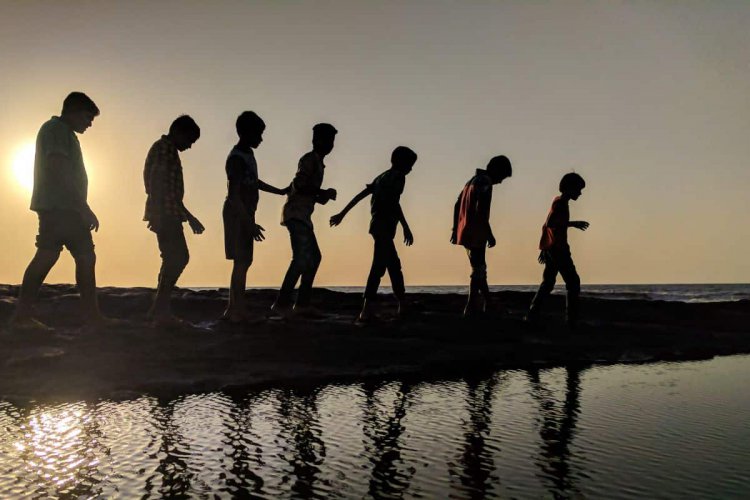“Struggling and suffering are the essence of a life worth living. If you’re not pushing yourself beyond the comfort zone, if you’re not demanding more from yourself—expanding and learning as you go—you’re choosing a numb existence. You’re denying yourself an extraordinary trip.”
– Dean Karnazes
Triathlons are arguably one of the most physically tough and mentally challenging tests of the human body and mind, it’s a test of your ability to excel under pressure. Since the age of eight (11 now) my boy has competed in triathlons, duathlons, aquathlons and Spartan races, and competes in football matches as well.
I introduced him to these sports initially as a way for us to bond while we spend time training together. I set him on this path, but he continued to better himself and compete against his own potential. The multi-sports competitions, especially the triathlon, taught him self-discipline, made him physically and mentally strong. More importantly, it taught him resilience and to persevere through adversity.
He has experienced every bump, bruise, fall, failure and victory in sports, and will continue to experience more. He understood he would win some, lose some, but from his very first competition, he decided that quitting was not an option. He persevered no matter the obstacles in front of him, no matter the pain. This crisis hasn’t been easy on him but he’s managing much better than I expected, thanks in part to the resilience he built doing sports.
Sports is a great way to teach kids valuable lessons and prepare them for the game of life. Dealing with their own personality during tough situations, they improve themselves and cope better with adversity.
Discipline. Kids involved in sports, whether on an individual level or a team level, learn that there is a goal to reach. Sports train kids to set goals and to address their own limits. In sports and life, success is achieved only with hard work and discipline. When kids go through something challenging, they learn from it, regardless of the outcome.
Since the onset of the pandemic, there’s been many articles on the effects to the economy, businesses, supply chains, jobs, the way we work, etc. but few on how our kids are coping through this mayhem. Our children are equally affected by the crisis, it has turned their lives upside down as much as ours. Like us, they are dealing with worry, fear, stress, and anxiety.
Resilience is crucial to how kids respond to challenges and changes in their lives, especially now when many are confused and anxious. Children are capable of extraordinary things. They have potential for happiness and greatness. They are equally affected by sadness and fear. We can’t change nor prevent the challenges they will face in their journey through life. What we can do is build their resilience, so these challenges do not break them.
Resilience is being able to bounce back from adversity, stress, challenge, tragedy or trauma. A big part of building a child’s resilience is ensuring they believe in themselves. We are not born with resilience; we learn it as we go through life. There’s no resilience gene, no one is blessed with it at birth, nor is there one way to be resilient, but it can be strengthened at any age. It involves social and emotional skills, goal setting, problem solving, self-awareness, empathy and gratitude.
Supportive relationships from our family, our friends, our faith, our culture, our home environment, our community in many ways help us shape our resilience. The way all this function plays a huge role in the capacity of a child to overcome adversity. We’re all products of our environment. Kids are not born with self-confidence or a positive attitude; they don’t automatically know how to conquer fear, accept feedback, overcome obstacles. These skills are learnt.
Some kids face more adversity than others. Some have better support systems available to them. Some have role models in their lives who demonstrate and teach them the skills they need to be resilient. The right experiences can shape the intrinsic characteristics of a child in a way that will build their resilience. We’re a culture that makes sure our kids are comfortable. We want them to have the best without having to go through the tough life lessons we’ve learnt growing up.
Some parents are overprotective, sheltering their kids from uncertainties as they can’t handle it themselves.This pandemic is proving that life is full of harsh surprises and face it we must, but not all of us can. Currently, one-third of the world’s population is living under some form of lockdown or quarantine. The number of infections has surpassed five million, deaths exceeded 332,000.
Initially when school closed, kids were excited to have the freedom. But the prolonged school closure has had a negative effect on children’s mental health as the structure and stimulation that it provided is no longer there. It’s no different from what we adults are going through. For many children, stress and anxiety started to set in two weeks into the lockdown when more restrictions were introduced. When the government announced the extension of the lockdown by an additional month many children were upset, confused, anxious, etc. Everything our kids are feeling, we are as well, only the intensity varies.
As parents, it’s our duty to prepare our children for the game of life. This is an ideal time to discuss with them about uncertainties and how-to slowly develop a mastery for problem solving. It’s an opportunity to help them be resilient. How you approach building resilience that works for you or your child might not work for someone else, it’s guided by your knowledge of your children. I write based on my own experience.
On-on-one time. Resilience comes from relationships; kids need nurturing. Of all the factors that boost resilience, a child’s relationship with a primary caregiver is often the most significant. This crisis has given us an opportunity to spend quality time with our children. It’s quality, not quantity, that counts. The one-hour lunch breaks we used to have at work is 1 hour of quality time at the dining table with the children. If you’re on your phone or iPad during lunch or dinner, you’re teaching your kids it’s OK to always be distracted and that they are not important enough for your sole attention. Talk about work, talk about school, talk about anything, just communicate with them, show them their thoughts matter.
Resilience rests, fundamentally, on relationships. You don’t need to carve out one-on-one time from your hectic schedule. Traveling in a car, walks, meals, grocery shopping, anytime, anywhere counts. Chat, listen, talk about your feelings, encourage them to express theirs. Once this time together becomes regular, your children will know they always have a safe space to open-up.
Confidence is built by overcoming obstacles to achieve our goals. I believe the more challenges a child faces and overcomes, the stronger they build their confidence. Fear is the enemy of self-confidence. All parents want to keep their kids safe but eliminating all risk robs kids of learning resiliency. The key is to allow age-appropriate freedom and risks, and teach our kids essential skills, set boundaries, but give them opportunities to think outside of the box, limit the limitations.
When my son competed in his first triathlon it required him to do a 200m open water swim. Even though he was a good swimmer, my wife was worried, she feared the worst as he had never swum in open waters before. He was scared as well, he feared there were sharks in the water, or he may not be able to manage the strong currents. But I assured him that the fear was only in his mind, there’s no sharks, he was a strong swimmer and if he followed his coaches’ instructions, he wouldn’t have any issues. It helped that he saw lifeguards were on standby. He nailed his first time trial on his first attempt and never looked back since. He faced his fears, overcame and built his confidence.
Helping our kids to get past their fear and leaping into uncertain situations is a skill they will incessantly apply to real life. Don’t rescue them at the first sign of a hardship. We live in a competitive society. All parents want their kids to be a top student at school. It’s not wrong to want our kids to achieve their highest potential but we must also teach children that failure is not the end of the world. Winning is not everything — but making the effort to win is, but importantly they can’t give up or quit.
Emotional Management. School closures and social distancing has led to kids struggling with isolation, anxiety, helplessness and boredom. They should understand that all emotions are okay. It’s okay to feel upset that they can’t go to school, meet their friends or grandparents, or play at the playground. It’s okay to be angry, okay to fear, give them the confidence to say, “we’ll get through this”.
Teach them to acknowledge the disappointments they are facing during this crisis, then gently steer them away from the negatives of the problem towards the opportunities it might have brought them. I did this by asking my son to write his own article on the Covid-19 disruption to his life which he did by covering his school life, his home life and his social life. He addressed his frustrations, his disappointments, all the negatives and found lots of positives to write about as well. More importantly, he appreciated that we understood how he felt, that he wasn’t alone feeling the way he did, and he got to share his feelings with the world. He published his article on Thrive Global, his first, certainly not his last.
During this crisis children are exposed to stressors and challenges. Managing this now will ensure that they are more able to deal with stress during adulthood. If we’re showing our children that this is a catastrophe and we’re worried, or fear for the future, then they’re going to learn that’s the way to handle the times now. As parents we must learn to manage our own fears and anxieties, because children look to us for how to react to stress.
Instead of trying hard to make our children feel safe, let’s make them brave. Anxiety usually comes from a fear of the unknown. As the saying goes “people fear what they don’t understand, hate what they can’t conquer”. So, let’s arm them with facts, give them a sense of control. Each morning my son reads the news on the virus in Singapore and abroad, from infections, to the number of deaths, to the economic impact, the various measures countries are adopting, on vaccine development, etc. There’s no censorship, no sugar coating the news. We then analyse it and find positives, with that his fears within subsides, he becomes optimistic of the future.
Children should learn that knowing the facts and staying calm helps, whereas lack of information, assumptions and stress on the other hand are counterproductive.
Optimism is a key characteristic of a resilient person. Optimistic kids experience more happiness and less distress because of their approach to life. They don’t give up, handle challenges easily, they are not afraid to fail. They accept unfavourable situations as they are, adapt and cope, work towards accomplishing their goals. With our help they can learn that struggle builds character, believe they can get through it and come out the other end stronger and better.
This crisis is not going to be a sprint, but a marathon. Investing in the resilience of our children is our responsibility. We’re facing challenging times, and we’ll find a way to push through this. But we, adults and kids alike, need to adjust our mindset, learn to deal with crisis, hold it together, be resilient, and be optimistic.

















